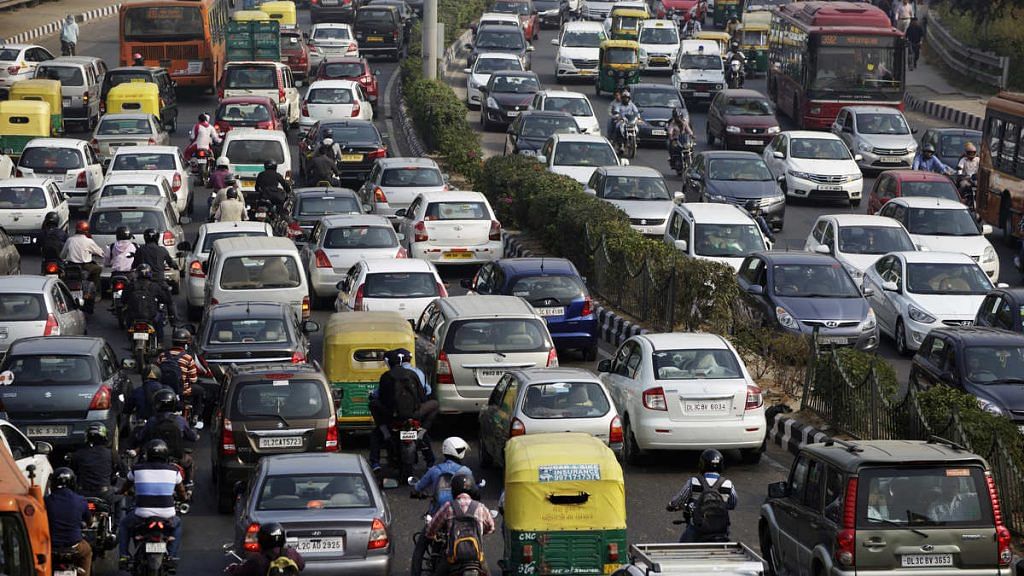New Delhi: Three months after Prime Minister Narendra Modi launched the country’s first voluntary vehicle scrappage policy in August, the Union Ministry of Road Transport and Highways has started taking baby steps to help states and Union territories create the necessary infrastructure to implement the policy.
The policy proposes deregistering personal vehicles that are over 20 years old from 1 June 2024 if they fail a fitness test. Commercial vehicles will be deregistered from 1 April 2023 if they are over 15 years old.
While the road ministry has announced a slew of incentives for people to get their old and unfit vehicles scrapped, the challenging part is the setting up of crucial infrastructure such as scrapping facilities and automatic vehicle fitness centres that are essential to operationalise the policy, which aims at reducing the rising vehicular pollution in Indian cities.
So far, only two states — Gujarat and Assam — have signed Memoranda of Understanding (MoU) with private companies to set up vehicle scrapping facilities. While the Gujarat government has entered into six MoUs, Assam has signed one.
“Anybody can come and set up scrapping facilities and automated testing centres. But we are encouraging private players to come forward and set up these facilities. The states will facilitate the private players in whichever way possible, be it by providing unencumbered free land or other financial incentives,” a senior road ministry official, who did not want to be named, said.
The ministry had on 23 September notified rules for setting up registered scrapping centres and automatic testing stations.
Of the six companies that have signed MoU with the Gujarat government, one — CMR Kataria Recycling Private Limited — will start work on phase one of the project this month. The company has leased 7.5 acres in Kheda to set up a registered vehicles scrapping facility (RVSF) at a total investment of Rs 25 crore.
India currently has just seven automated fitness test centres and two authorised vehicle scrappage centres.
Also read: 5% off on new vehicles, up to 25% rebate on road tax — govt incentives to scrap old vehicles
Investor summits, incentives
According to road ministry estimates, 51 lakh light motor vehicles (LMVs) in the country are currently over 20 years old, while 34 lakh are over 15 years old.
There are an estimated 17 lakh medium and heavy vehicles, which are over 15 years old and are plying without fitness certificates. These vehicles not only result in increased vehicular pollution but also endanger road safety.
To build up the momentum, the road ministry is holding investor summits in states and Union territories (UTs) to create awareness and attract investors to set up RVSFs and automatic fitness centres. So far, such investor summits have been held in Gujarat, Punjab, Haryana, Chandigarh and Andhra Pradesh.
“We are talking with the state government to expedite setting up of such facilities,” the official quoted earlier said.
However, the official added, there are challenges involved. “Private players are apprehensive about the market. We are asking states to give sops to private players.”
The Modi government has also set up a national single-window system where an applicant wanting to set up scrappage centres or automatic testing facilities can apply for registration, after submitting the required documents and fees. States will have to clear the proposal within 60 days.
The road ministry has also announced stringent measures such as increasing the renewal fees for registration of private vehicles that are over 20 years old, and imposing a steep green tax on polluting vehicles.
To incentivise vehicle owners, the policy proposes that automobile manufacturers give a 5 per cent discount to those who come to buy new vehicles after getting their old vehicle scrapped.
The road ministry has also issued advisories to states and UTs asking them to give discounts in registration fees and road tax to such buyers.
(Edited by Neha Mahajan)
Also read: What’s the new vehicle scrappage policy that will create 35,000 jobs & help ‘circular economy’
